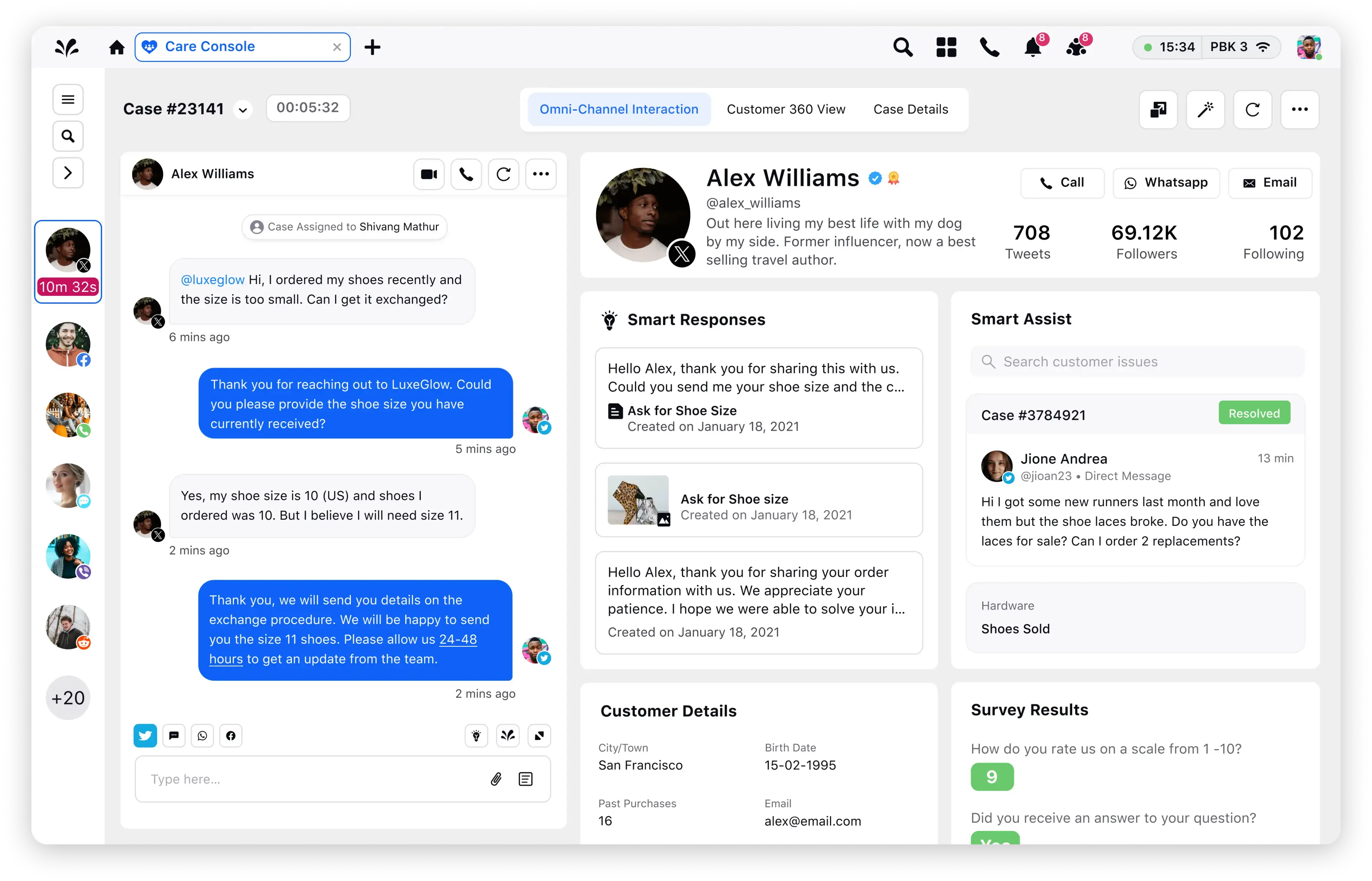The next generation of CCaaS is here
Digital-first customer service, enterprise-scale voice support. Redefine customer service with an AI-powered platform that unifies voice, digital and social channels. Power channel-less interactions and seamless resolution no matter the channel of contact.

Leverage AI To Make Your Agents’ Lives Convenient
Customer experience is a critical aspect of a brand's relationship with its customers, and its contact center plays a vital role in shaping this experience. In today's fast-paced world, customers expect efficient and effective solutions to their queries and concerns, highlighting the need for preparedness on the part of contact centers and their agents.
When the service provided by the contact center falls short of the customer's expectations, it can result in negative consequences such as lower customer satisfaction ratings, decreased net promoter scores, higher customer turnover rates, reduced lead-to-customer conversions, and potential noncompliance issues for the company.
PwC's "Future of CX" report, based on a survey of 15,000 consumers, revealed that one in three customers will switch away from a beloved brand following a single negative experience, while 92% would entirely cease doing business with a company after two or three negative interactions.
Equipping customer service agents with the right tools is essential to meet evolving customer expectations. AI-powered solutions have proven to be a valuable asset in this regard, significantly enhancing the efficiency and convenience of customer service agents. By automating routine and time-consuming tasks such as call routing, data entry, and knowledge base management, AI frees up agents to focus on high-value interactions that require empathy, creativity, and problem-solving skills.
Additionally, AI can also analyze customer data and interaction history to provide agents with personalized insights and recommendations that enhance the customer experience. This, in turn, can improve decision-making and lead to better customer experiences and a significant positive impact on the overall success of a business.
A major call center located in the Philippines observed a 69% increase in job satisfaction among agents after providing them with AI tools.
While the statistics appear positive, call centers often face various challenges that can impact the morale and effectiveness of agents, resulting in absenteeism, agent turnover, and decreased customer service quality. While addressing surface-level issues can help to mitigate some problems, there are deeper-rooted challenges that need to be addressed as well.

Major challenges faced by contact center managers and agents
Here are some of the most common call center problems:
1. High attrition rate of agents: Gartner research finds that only one out of three customer service reps feel engaged with their contact center, and disengaged reps are 84% more likely to churn. High attrition rates among agents can be a significant challenge for contact centers, as it can result in increased costs associated with recruiting, hiring, and training new agents.
Additionally, the loss of experienced agents can lead to a decline in overall performance and customer satisfaction, as new agents may take time to become proficient in handling customer queries and issues.
2. High agent response time: High agent response time can be a major challenge for contact centers, as it can impact the customer experience and lead to lower CSAT and NPS scores. With a large volume and variety of inbound queries, agents may struggle to quickly access the resources they need to effectively resolve cases.
3. Ineffective written communication skills: Effective written communication skills are essential for delivering exceptional customer service. When agents lack a firm grasp of the language in which they are communicating, it can lead to poor spelling, improper grammar, and other mistakes that can harm the brand's image in the eyes of the customer.
Poorly written responses can be frustrating for customers, as they may struggle to understand the agent's message, leading to additional back-and-forth exchanges and longer resolution times. Moreover, customers may perceive the brand as unprofessional or careless, leading to a decline in customer satisfaction levels.
4. Lack of personalization: When the inbound volume of cases is high, agents may use the same canned responses to address a particular type of issue, which can lack a certain level of personalisation and come across as robotic. This can lead to lower customer satisfaction levels and higher churn rates.
Moreover, for non-native speakers of the language, it can be challenging to curate new responses quickly while maintaining high precision levels and a consistent brand voice.

5. Repetitive manual tasks: In addition to handling customer interactions, agents also have to perform repetitive manual tasks such as documenting the case, tagging the case category, and updating customer information in the CRM. These tasks can be tedious and time-consuming, increasing the agents' average handle time (AHT) and the operational costs of the contact center.
6. Promise management: During a customer interaction, an agent may need to make promises to the customer to follow up on their issue or provide additional information. However, manually setting up reminders to keep those promises can be a time-consuming and error-prone process, particularly when dealing with a large volume of inbound cases.
7. Managing compliance: According to NTT, despite the growing popularity of self-service options, 95.5% of customers still prefer having the option to speak to a human agent when needed.
Agents are the voice of the brand, and it is their responsibility to ensure that they maintain a high level of professionalism, courtesy, and empathy while interacting with customers.
In addition to providing courteous and empathetic support, contact centers must also ensure that agents do not use any language or phrases that could potentially damage the brand's image. This includes avoiding forbidden jargons, profanity, and other inappropriate keywords that could violate compliance guidelines.
8. Handling escalations: Handling customer escalations is a critical aspect of a contact center's operations. It is important for agents to be able to identify when a customer is dissatisfied and is displaying signs of potential churn.
When a customer is at risk of churning or is demanding an escalation, it is crucial to handle their case on a priority basis. Failure to do so can result in the loss of a valuable customer, decreased customer loyalty, and damage to the brand's reputation.

AI features that every contact centre must have to make their agents' lives more convenient
Artificial Intelligence (AI) has transformed the way contact centers operate, enabling them to deliver more efficient and personalized service. In this regard, AI features can greatly enhance the productivity and convenience of contact center agents.
1. Suggesting knowledge base (KB) articles and resolved historical cases to agents: By using natural language processing (NLP), AI-powered tools can suggest relevant knowledge base (KB) articles and previously resolved cases to agents based on the current case they are handling. This feature helps agents save time by eliminating the need to switch between windows to search for solutions, ultimately reducing the average response time.
Contact centers can also benefit from reduced training costs for newly onboarded agents who can access these resources while handling a case.
2. Grammar and spell check: To ensure a brand's reputation is maintained, it is crucial for contact centers to have grammar and spell check tools for written communications.
AI-powered grammar tools can adapt to a contact center's writing style and provide real-time suggestions to agents regarding spelling and grammar, reducing the likelihood of errors and inconsistencies in the brand's voice. This ensures that customer interactions are professional and accurate, improving overall customer satisfaction.
3. Paraphrasing tools: Contact centers can use AI-powered paraphrasing tools to provide agents with a range of options for standard written answers. These tools, when built on a brand's data, can help agents deliver more personalized responses to customer queries, making the overall experience feel less robotic. By leveraging these paraphrasing tools, contact centers can deliver a more human-like experience to customers and improve their overall satisfaction.
4. Summarize case conversations: By leveraging AI-powered smart summarizers, contact centers can automate the tedious process of logging, tagging and updating customer information during a case. These smart summarizers can focus on key aspects of the conversation, such as the customer's issue or query, the agents' assistance and probing, and any further requirements for an unresolved case. By automating this process, contact centers can reduce case handling times for agents, lower operational costs and improve overall efficiency.
5. Guiding agents to manoeuvre cases: Contact centers can leverage AI-powered virtual assistants that provide guided workflows for agents. These guided workflows offer step-by-step guidance on how to probe customers to resolve their queries or issues effectively. By following these AI-powered guided paths, agents can navigate through cases with greater efficiency and reduce case handling times.
6. Suggesting next best actions in real time: During the course of a case, it is imperative for agents to keep a track of certain events like promises made to customers for call backs, supervisor escalation requests, detecting customer churn and much more.
These prompts can be provided to agents in real time in the form of nudges enabling them to reduce case handling time, managing any promises made and correct the course of a case in case an agent makes a mistake.
7. Suggesting relevant responses: To save time and improve efficiency, contact center agents can benefit from AI-based tools that suggest relevant responses while communicating with customers on digital platforms.
These tools analyze past conversations between agents and customers to provide agents with curated responses or compose complete responses for ongoing conversations. By using these tools, agents can focus on more complex tasks and ensure a consistent brand voice in their interactions with customers. Additionally, the use of AI-based response suggestions can help to reduce errors, improve adherence to service level agreements (SLAs), and enhance the overall customer experience.
8. Ensuring response compliance: To ensure compliance with company policies and regulatory guidelines, contact centers update their workflows regularly.
AI-based compliance tools can be programmed to monitor agent conversations in real-time to detect instances where agents may be deviating from established guidelines. These tools can identify key phrases or words that are associated with non-compliance and can flag these conversations for further review by supervisors.
Additionally, compliance tools can generate reports that provide insights into the frequency and nature of non-compliance issues, which can help contact center managers identify areas for improvement in their policies and training programs.
In conclusion, AI technology has the potential to significantly improve the lives of customer service agents by automating repetitive tasks, providing personalized recommendations, and streamlining workflows. By leveraging AI, businesses can not only improve the efficiency of their customer service operations but also provide a better customer experience overall.

Wrapping up
As AI technology continues to evolve and improve, it is likely that we will see even more innovative ways to leverage it to make agents' lives more convenient and to deliver exceptional customer service.
Sprinklr is a platform that utilizes AI technology to transform contact centers and enhance agent performance. Its agent assistance module includes features like Smart Comprehend and Similar Cases, which provide agents with historical cases and knowledge base articles, and an AI-powered grammar tool to ensure clear and concise communication with customers.
Other features, such as Smart Summaries, Smart Replies, and Smart Paraphraser, help agents save time and reduce errors. Guided Workflows and AI-powered nudges offer real-time guidance, enabling agents to quickly and efficiently address customer queries. By leveraging Sprinklr's AI-powered tools, businesses can improve their customer service operations and deliver exceptional customer experiences.

